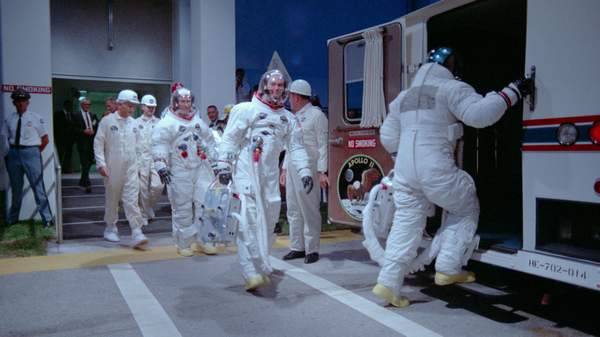Overview
UPDATE, February 5, 2021: Apollo 11 is available to stream via Amazon Prime Video, Google Play, YouTube Movies and iTunes.
For those born after humanity initially visited the moon, it's easy to take the amazing achievement for granted. It has been 47 years since anyone has strolled across the earth's only natural satellite, but our ability to soar into space and tread on the lunar surface if we wanted to still seems like a given. With 2019 marking five decades since Neil Armstrong took one small step for man and one giant leap for mankind, the timing couldn't be better to consider the historic Apollo 11 mission in detail. Naming his documentary after the pioneering spaceflight, director, editor and producer Todd Douglas Miller knows that anyone can run through the ins and outs of the preparation, voyage and on-the-ground hoopla. Only by assembling an astounding array of archival audio and video footage, however, can a documentary dare to dream about capturing not just the expedition, but the complete experience.
How does it feel to place one foot in front of the other on a celestial body located nearly 400,000 kilometres above the earth, as Armstrong and Buzz Aldrin did? What was it like to be back at Cape Canaveral viewing the rocket launch? Or to be in NASA's mission control centre during the eight days that the vessel's three-man crew were in the air? They're questions that Apollo 11 endeavours to answer. While space-based films have tracked nearly every other possible aspect of venturing into the heavens, especially in science fiction, relaying the one thing that humanity has actually accomplished has always proven trickier until this exceptional doco. In the inky darkness above us, no one can hear you scream, according to Ridley Scott's Alien — and yet, if you're Armstrong, an entire planet can hang on your every word while you're taking the first-ever walk across the moon. Last year, Damien Chazelle's First Man went to great lengths to show that iconic incident from the late astronaut's perspective, but there's simply nothing like watching the real thing.
As an editor, Miller's task is immense, trawling through more primary materials than any filmmaker tackling the moon landing could hope to have at their disposal. The Dinosaur 13 director not only received access to a wealth of newly discovered, previously unprocessed 65mm visuals, but to more than 11,000 hours of uncatalogued audio recordings featuring 60 key personnel. Delving into such a treasure trove, he follows a linear timeline. Although that may sound straightforward, the end result is by no means standard. Apollo 11 flies meticulously through the intricacies of its eponymous mission, specifically highlighting the launch of the Columbia spacecraft, the Eagle lunar module's descent to the moon, the process of reconnecting the two vessels together afterwards and the re-entry into the planet's atmosphere. More than that, it makes viewers feel as if they're there as well — waving flags in Florida, muttering into headsets in Houston, careening through space and stepping onto the moon's powdery white surface.
There's a basic principle at work here, and one that Apollo 11 puts into action in the best possible way: show don't tell. For the last 50 years, the world has deployed countless words to discuss the mission's feat — perhaps that's why we've lost our sense of wonder about it — so Miller doesn't waste time recapping, recounting or analysing. Although Aldrin and fellow Apollo 11 astronaut Michael Collins are still alive, he doesn't ask them to chat about the space venture either. Rather, he lets the materials from the period offer a portal back to the past. Eschewing narration and interviews, the filmmaker relies upon his stunning archive to relay this monumental story. Nothing else is necessary; vivid and teeming with life, Apollo 11's footage and audio truly goes above and beyond, especially when seen on the big screen. It gives the big, weighty moments their time to shine, including Armstrong's famous words. It features astonishing off-the-planet sights, such as the view of Earth from such great heights. It also turns seemingly routine minutiae, of which there's plenty, into a jaw-dropping spectacle.
Indeed, much of the documentary's power stems from its vibrancy, not just in observing the nuts and bolts of the spaceflight, but in making this immersive portrait of five decades ago appear virtually futuristic. The movie's images are that comprehensive, even with the obvious 60s-era clothing, furniture and technology, that they feel almost unreal. The open and engaged looks on everyone's faces evoke the same sensation, as do their relaxed and respectful conversations, because such collective camaraderie and widespread earnestness aren't overly common in the 21st-century. Of course, it should feel extraordinary to ponder something as significant as sending people to the moon, let alone to bear witness to it. Continuing that sentiment, Apollo 11 doesn't simply transport the audience back in time, or immortalise one of humanity's greatest achievements in never-before-seen detail — it also provides a glaring snapshot of who we were, what we once valued and how much we've changed in such a short period.
Features
Information
When
Thursday, July 18, 2019 - Wednesday, August 14, 2019
Thursday, July 18 - Wednesday, August 14, 2019
Where
Select cinemas in BrisbaneVarious locations
Price
$15–25-
Event Type
